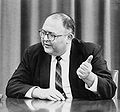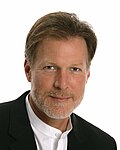Portal:Systems science/Systems scientist
| This Wikipedia page has been superseded by Portal:Systems science and is retained primarily for historical reference. |
| Note: Article entries are now being transcluded directly on the main portal page. However, this page should be retained for historical reference. |
Selected Systems scientist

Joseph Francis Shea (September 5, 1926–February 14, 1999) was an aerospace engineer and NASA manager. As head of the Apollo Spacecraft Program Office, Shea played a key role in shaping the course of the Apollo program, helping to lead NASA to the decision in favor of lunar orbit rendezvous and supporting "all up" testing of the Saturn V rocket.
Shea's speciality was systems engineering: a new type of engineering in the 1950s that focused on the management and integration of large-scale projects, turning the work of engineers and contractors into one functioning whole. He played a significant role in the Titan I project; as George Mueller writes, "he contributed a considerable amount of engineering innovation and project management skill and was directly responsible for the successful development of this pioneering guidance system...."
Herbert Alexander Simon (June 15, 1916 – February 9, 2001) was an American political scientist whose research ranged across the fields of cognitive psychology, computer science, public administration, economics, management, and philosophy of science and a professor, most notably, at Carnegie Mellon University.
Simon was not only a polymath, but a truly innovative thinker. He was among the founding fathers of several of today's most important scientific domains, including Artificial Intelligence, information processing, decision-making, problem-solving, attention economics, organization theory, complex systems, and computer simulation of scientific discovery. He coined the terms bounded rationality and satisficing, and was the first to analyze the architecture of complexity and to propose a preferential attachment mechanism to explain power law distributions.

Herman Kahn (February 15, 1922 – July 7, 1983) was a military strategist and systems theorist employed at RAND Corporation, USA. His theories contributed to the development of the nuclear strategy of the United States.
Kahn's major contributions were the several strategies he developed during the Cold War to contemplate "the unthinkable," namely, nuclear warfare, by using applications of game theory. During the mid-1950s, the Dwight D. Eisenhower administration's prevailing nuclear strategy had been one of "massive retaliation", enunciated by Secretary of State John Foster Dulles.

Eberhardt Rechtin (1926–2006) was an American systems engineer and respected authority in aerospace systems and systems architecture. He received both his BS (1946) and PhD (1950) degrees from Caltech. He worked at Caltech's Jet Propulsion Laboratory from 1948-1967, holding, among other positions, that of chief architect and director of the NASA Deep Space Network.
He became the Director of DARPA in 1967, and stayed in the Defense Department as Assistant Secretary for Telecommunications. He was president and CEO of The Aerospace Corporation from 1977–1987. In 1987, he left Aerospace to found the systems architecture graduate program at the University of Southern California, from which he retired.

Kevin Warwick (born 9 February 1954 Coventry, UK) is a British scientist and professor of cybernetics at the University of Reading, UK. He is probably best known for his studies on direct interfaces between computer systems and the human nervous system, although he has done much research in the field of robotics.

Margaret Mead (December 16, 1901, Philadelphia – November 15, 1978, New York City) was an American cultural anthropologist who was frequently a featured writer and speaker in the mass media throughout the '60s and '70s as a populariser of the insights of anthropology into modern American and western life but also a respected, if controversial, academic anthropologist.
Her reports as to the purportedly healthy attitude towards sex in South Pacific and Southeast Asian traditional cultures amply informed the '60s "sexual revolution" and it was only at the end of her life and career that her propositions were – albeit controversially – challenged by a maverick fellow anthropologist and literate members of societies she had long before studied and reported on. Mead was a champion of broadened sexual mores within a context of traditional western religious life.

Stuart A. Umpleby (1944) is an American cybernetician and is a professor in the Department of Management and Director of the Research Program in Social and Organizational Learning in the School of Business at the George Washington University. Umpleby has made important contributions in the areas of cybernetics and systems theory, the philosophy of science, and management methods. Other interests have been demography, the year 2000 computer crisis, academic globalization, and the transitions in the post-communist countries.
Following his work on biological cybernetics and social cybernetics Umpleby suggested a way of unifying the philosophies of realism, constructivism, and pragmatism by combining world, description, and observer. Building on the work of E.A. Singer, Jr., C. West Churchman, and Russell L. Ackoff, Umpleby has suggested that, since managers are part of the system they seek to influence, methods rather than theories might be the most effective way to structure knowledge of management.

Norbert Wiener (November 26, 1894, Columbia, Missouri – March 18, 1964, Stockholm Sweden) was an American theoretical and applied mathematician. He was a pioneer in the study of stochastic and noise processes, contributing work relevant to electronic engineering, electronic communication, and control systems.
Wiener also founded cybernetics, a field that formalizes the notion of feedback and has implications for engineering, systems control, computer science, biology, philosophy, and the organization of society.

Dennis Meadows (1942) is an American scientist and professor of Systems Management and director of the Institute for Policy and Social Science Research at the University of New Hampshire.[1] He lives in Durham, New Hampshire. known as co-author of Limits to Growth.
"In 1972 it was inconceivable to most people that the physical impact of humanity’s activities could ever grow large enough to alter basic natural processes of the globe."[2] In that time "we had to talk in our first edition of Limits to Growth about future problems."[2] Their studies showed "that humanity’s activities were still below sustainable levels. Now they are above. In 1972 our recommendations told how to slow growth."[2] Now, Meadows said, "we must tell people how to manage an orderly reduction of their activities back down below the limits of the earth’s resources".[2]
Reference
- ^ Dennis Meadows :: Chelsea Green Publishing
- ^ a b c d EuroNatur: Interview with Dennis L. Meadows, retrieved online: 2009-05-13
W. Ross Ashby (September 6, 1903, London - November 15, 1972) was an English psychiatrist and a pioneer in cybernetics, the study of complex systems. His first name was never used, and generally, he was called 'Ross Ashby'.
Despite being widely influential within cybernetics, systems theory and, more recently, complex systems, he is not nearly as well known as many of the notable scientists his work influenced including Herbert A. Simon, Norbert Wiener, Ludwig von Bertalanffy, Stafford Beer and Stuart Kauffman.

George Jiri Klir (born 1932 Prague, Czechoslovakia) is a Czech-American computer scientist and professor of systems sciences at the Center for Intelligent Systems at the State University of New York at Binghamton, New York.
George Klir is known for path-breaking research over almost four decades. His earlier work was in the areas of systems modeling and simulation, logic design, computer architecture, and discrete mathematics. More current research since the 1990s include the areas of intelligent systems, generalized information theory, fuzzy set theory and fuzzy logic, theory of generalized measures, and soft computing.

Gary S. Metcalf (born 1957) is an American organizational theorist, management consultant, and faculty member in the Organizational Systems concentration at Saybrook Graduate School. He received a Ph.D. in human science at Saybrook under the mentorship of Béla H. Bánáthy focused on Social Systems Design and Organizational Development.
Gary Metcalf is known for his 2001 book "The management of people in mergers and acquisitions" with Teresa A. Daniel. They explain that financials alone don't make mergers and acquisitions deals work. Human resource executives act as "change agents during the delicate maneuverings before a deal is done, and then after, when it's time to tackle the fine-grained problems of integrating disparate corporate cultures and the people who vitalize them".
